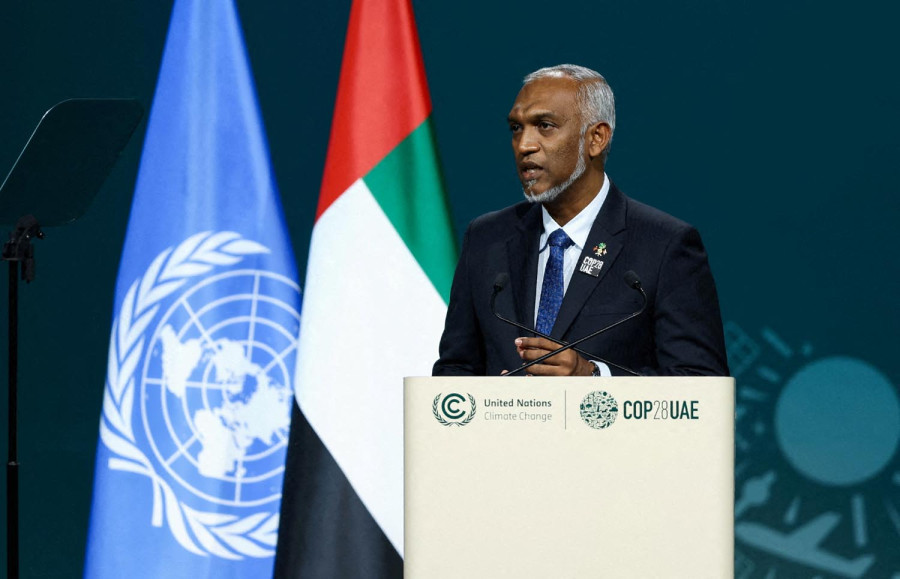Columns
Muizzu’s balancing act in the Maldives
Several powers are contesting for influence in the Indian Ocean countries.
Smruti S Pattanaik
The Maldives held its much-awaited parliamentary election on April 17. Not surprisingly, the People’s National Congress (PNC), along with its coalition parties, won 75 seats in total while the Maldives Democratic Party (MDP), the erstwhile ruling party’s strength in the Parliament, dwindled to only 12 seats from 65 seats previously held. The PNC alone won 66 seats, showing that the other parties in the coalition would play a marginal role.
This ‘supermajority’, as described by Maldivian media, will strengthen President Muizzu’s hand in charting policies without being obstructed by the opposition in Parliament. Meanwhile, his alliance partner, the People's National Front (PNF) president and former president of the Maldives, Abdullah Yameen, was freed from jail just two days before this election. Muizzu's victory would have several geopolitical implications as he charts his ultranationalist foreign policy.
Fallout with former ally
Muizzu’s fallout with Abdullah Yameen may not threaten his political sustenance; rather, the divided opposition is not in a position to pose much challenge to his policies. Though Muizzu was the contingency presidential candidate in case Yameen failed to contest due to his conviction, the Progressive Party of Maldives (PPM)-PNC coalition’s senate rallied behind Muizzu’s candidacy and rejected Yameen’s proposal to boycott the election. Since he was elected president, Muizzu has tried to sideline Yameen and has appointed a cabinet without consulting him, which deepened the rift between the two. Yameen’s loyalists accuse Muizzu of refusing to take phone calls from Yameen after his election.
After Muizzu was elected President, Yameen was transferred from the jail where he spent his days after being convicted of corruption charges to house arrest. However, his newly created party PNF, Democrats and Adhaalath Party (AP), could not win any seats in the parliamentary election. This is a serious blow to Yameen’s political aspirations.
Economic downturn
The debt situation has worsened in the country even though it has not reached the stage of bankruptcy. Muizzu has asked for development funds from China to anchor a pro-China foreign policy while requesting India to restructure debt repayment and stagger it to help the Maldives to repay commensurating with its economic ability and at the same time to continue with projects that have already been sanctioned by the government. Muizzu also wants to bolster the free trade agreement with China without assessing the impact on its economy in its bid to reaffirm the previous policy charted by former President Abdullah Yameen. This clearly shows that Muizzu would have to balance the country’s economic situation while looking for more loans to develop infrastructure projects essential for its economic growth.
China’s share of the Maldives’ debt is 37 percent. The International Monetary Fund has categorised the Maldives as a high-risk debt-distressed country. The World Bank has predicted 5.4 percent growth from 2024 to 2025. The country's debt vulnerability is pegged at 115 percent of the GDP, and its external and internal borrowing would make it financially vulnerable.
The Maldives imports essential commodities from India. Both countries are discussing introducing trade in local currency to address the dollar shortage. In July 2023, the Reserve Bank of India permitted the Maldives to open Special Rupee Vostro Accounts (SRVAs) to facilitate trade in local currencies. In April of this year, India’s Directorate General of Foreign Trade also removed the export curbs on onion, rice, sugar, wheat flour and stone aggregate for the country.
Like other South Asian countries, the Maldives’ tax revenue is very low. It depends on imports to sustain. According to the Asian Development Bank’s report, the outgoing Solih government's decision to increase the Goods and Services Tax rate by 40.0 percent for the general sector and 33.3 percent for the tourism sector has increased the price of essential commodities. Foreign exchange reserves have slumped. Subsidies have increased to provide economic relief.
Tourism booms
The tourism industry has grown significantly even though Indian tourist arrivals have declined. According to reports, Indians travel to the Maldives during the summer, which is a fill-up to the off-season tourism, as most Western tourists prefer to travel in winter. Indian tourists were the largest in 2023. The government has set the goal of achieving over 2 million tourist arrivals and 14.3 million bed nights for 2024 to generate revenue. This also requires huge investments and facilities to accommodate tourists and boost the local economy. In this context, reducing the number of Indian tourists arriving in the Maldives would be a major concern for the Maldivian government. Some estimate the loss to the Maldivian economy to be around $2.5-5.5 million after India dropped to fifth place in the Maldivian tourism chart.
In recent years, the Maldives has seen growth in the tourism sector, which is likely to generate revenue for the cash-strapped economy, boost GDP growth and create employment opportunities for the locals.
Geopolitical balancing
In the past few months after his election, Muizzu has also successfully replaced Indian military trainers with civilian trainers, which he can boast of as his foreign policy success. He has also managed to elevate the Maldives’ relations with China to a strategic level by signing the China-Maldives Comprehensive Strategic Cooperative Partnership (2024-28). They signed 20 agreements, some focusing on the defense sector. The political ecosystem would be conducive to Chinese investment as Beijing aspires to have a foothold in the Western Indian Ocean.
Several powers have hotly contested for influence in the Indian Ocean countries. However, this contest is seen as a binary in the Maldives—India vs China. Muizzu’s task will be to balance the interests of both countries and extract benefits for the Maldives. Given the economic situation of India and China and their investment in the Maldives, it would be difficult for Muizzu to play one against the other. Given the Maldives’ proclivity to play the China card as it did when Muizzu allowed the docking of Chinese Xiang Yang Hong 03 ‘research vessel’ ostensibly for replenishment, India has decided to build its own Naval base in Lakshadweep. Cooperation between India and the Maldives continues, as the trilateral India-Maldives-Sri Lanka trilateral Dosti-16 exercise took place in February.




 8.75°C Kathmandu
8.75°C Kathmandu















